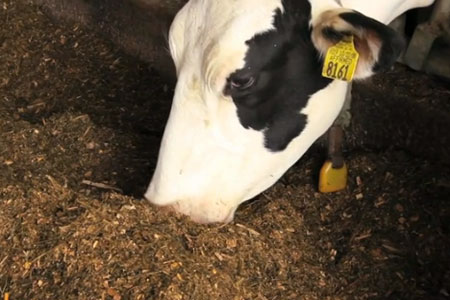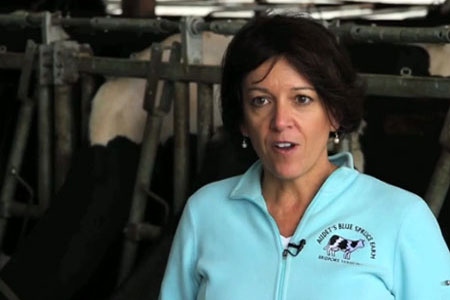’Cow Power’ shows manure energy benefits
A recent graduate is putting the “moo” back in movement with her new documentary on the push to use cow manure as a leading source of renewable energy on farms.

Allison Gillette ’12 released her 55-minute documentary, Cow Power, which is narrated by former Vermont governor Jim Douglas, last month. It will be screened Tuesday, September 17, at the Bright Family Screening Room in the Paramount Center as part of the Department of Visual and Media Arts’ Bright Lights weekly film series.
Citing the dropping number of farms in her native Green Mountain State, Gillette’s film advocates for a government program that provides funding for farmers to adopt the practice of using cow manure as an energy source.
Douglas is the brother-in-law of farmer Robert Foster, who is featured in the film.

“This is a story about a statewide community that has banded together to support the failing dairy industry and the environment,” Gillette said. “It proves that passion and kindness lead to innovation and a better standard of living.”
The methane gas in cow manure is 75 percent efficient—compared to 30 percent efficiency from wind power and 12 percent from solar power, according to press materials from Cow Power.
Using manure for energy poses a tremendous financial burden on farmers and has been “virtually impossible in other states,” according to Cow Power. Vermont is the first state to use public funds to offset the cost.

Cow Power follows the stories of two farms that embraced the manure energy process, and interviews the program manager of the Energy Innovation Center who helped craft the state program.
“I pursued a degree in documentary film at Emerson because I am passionate about informing and inspiring others,” Gillette said. “I have always been inspired by the community atmosphere in the state and the innovative ways Vermonters solve problems.”
Gillette, who as director oversaw a cast and crew of about 30 people, raised more than $6,000 on Kickstarter to produce the documentary, which she decided to create after seeing a poster at Emerson advertising a documentary pitching contest.
The film got support from the campus organizations Captured Emotion, Women in Motion, and Emerson Peace and Social Justice.
Cow Power has been covered by several Boston- and Vermont-based news outlets.
Categories